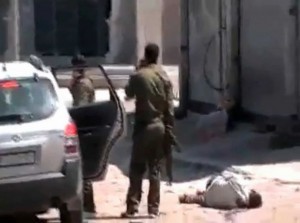Experts in Death Do Not Cry

I am a documenter of death. I watch videos that show martyrs so as to record their names and the details of their death — dozens a day, and when we periodically update our database, the number reaches hundreds within a few hours. The average length of a single video is one minute. In one hour you could watch as many as 60 bodies, unless the footage depicts mass massacres; then the number would multiply.
One corpse after the other; one is shrouded, another still covered in wounds and blood. While some of the faces show shock and awe – is that you, Death? – others look so peaceful that they could be mistaken for sleeping. Some of these faces are beautiful. They have soft skin, a tight mouth and a hint of an intelligent smile. The sight of child martyrs will always scar our souls.
The female martyrs are the least conspicuous in the video clips. You would probably have to summon up their features from your imagination. Women depart silently on YouTube, and we often do not get the chance to accompany the rituals of pain in the first few moments after they are gone.
The cruelest videos, however, are those that show people taking their last breath. In situations like these, you find yourself forced to keep watching till the end instead of moving on to another video. You have to hold the hand of the person through the computer monitor, looking him closely in the eyes, while you listen to his last rattles, even if the scene is painful enough to make you feel your own eyes are being pulled out. Perhaps he is saying something in the language of death’s twilight, sending out an apology to his loved ones or telling his mother how much he misses her – or maybe is only singing. You want to listen, but those surrounding the twitching body do not give you a chance to hear his message.
“Say your shahada! Say your shahada!” they yell, urging the wounded to prove his faith to his creator by acknowledging there is no God but Allah. If I were him, I would have wished that they would tell me I will live on and on, and to close my eyes in the sweet hope of returning to my loved ones. I would have wished someone to hold me in my last moments and silently caress my head. What is worse is that most of these clips end before the soul of the deceased depart his body, and hence his death rattles remain in your mind without ever being replaced by peace that comes from death.
A few clips show martyrs recording a message before their death. Some of these show only their gaze and a few words addressed to their loved ones. Abdel Muhaimen al-Younes is lying on the grass with his rifle in front of him, nervously playing with straws in the soil. He asks us to wish him mercy if he dies, then tells his mother he has missed her, while tears fill his eyes. But the heroes of the Free Syrian Army don’t cry, so he turns his face away and asks the cameraman to stop filming.
Every time I recall this video I wish I could burst into tears, but I don’t; the experts in monitoring death don’t cry either. Their tears do not even appear when watching the video of a father in Rastan running like a madman with his child in his arms, whose lower part of the body was reduced to a skeleton. The super-intelligent bomb had left the child’s head in a better condition so that the father could recognise him and stroke his hair for the last time.
Videos that show parents and children are a totally different story. When the family is there, you will mostly hear their wailing. A mother directs her prayers towards the heavens, asking that the murderer be tormented by losing his children, while children pray that the ordeal of being an orphan be inflicted upon him.
One of the children amazed me when he insisted that his father did not die.
“I swear to God he’s still alive! His eyes are still open!” he kept telling those encircling the body.
Some of the mothers fool us, or try to. They bid their sons farewell without a tear, with a faint, calm voice. They sound like a mountain talking from the height of its own peak, or a valley from the depthof its own abyss. They declare their sons martyrs, while hiding their pain, I do not know where or how.
I deeply love these women. Someone documenting death knows what it is like not to be able to cry when, in fact, he or she should. Is weeping not a fundamental human right that has accidentally been dropped from international charters?
The details of death are endless – videos contain thousands of them. Death documentation experts like us don’t cry, they simply watch, open-mouthed and frowning, while occasionally hearing a howling voice inside of them. They constantly wonder whether they, who document death through their computer screens, or those who do so with their own eyes and fingers, will ever become “normal” creatures again, or whether death holds them eternally them captive on its isthmus.

